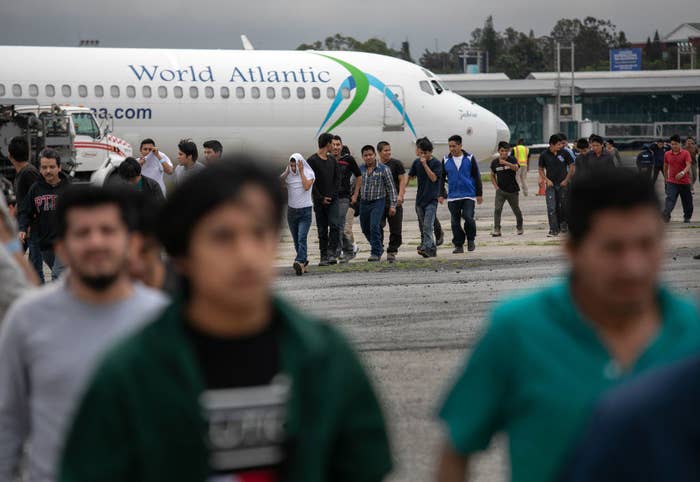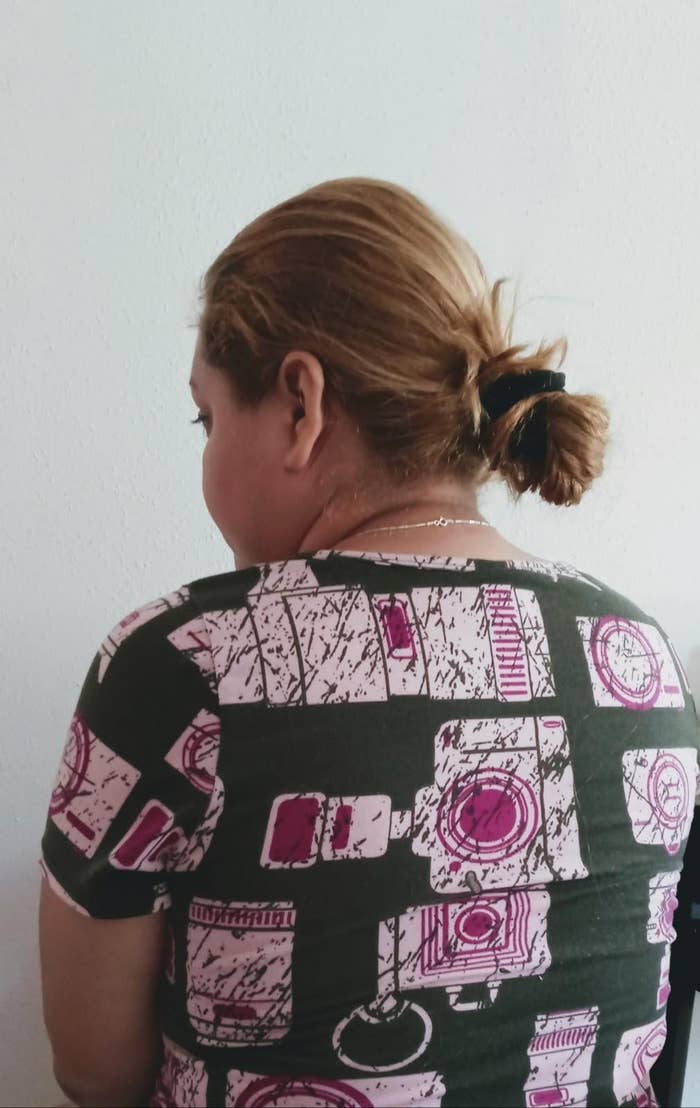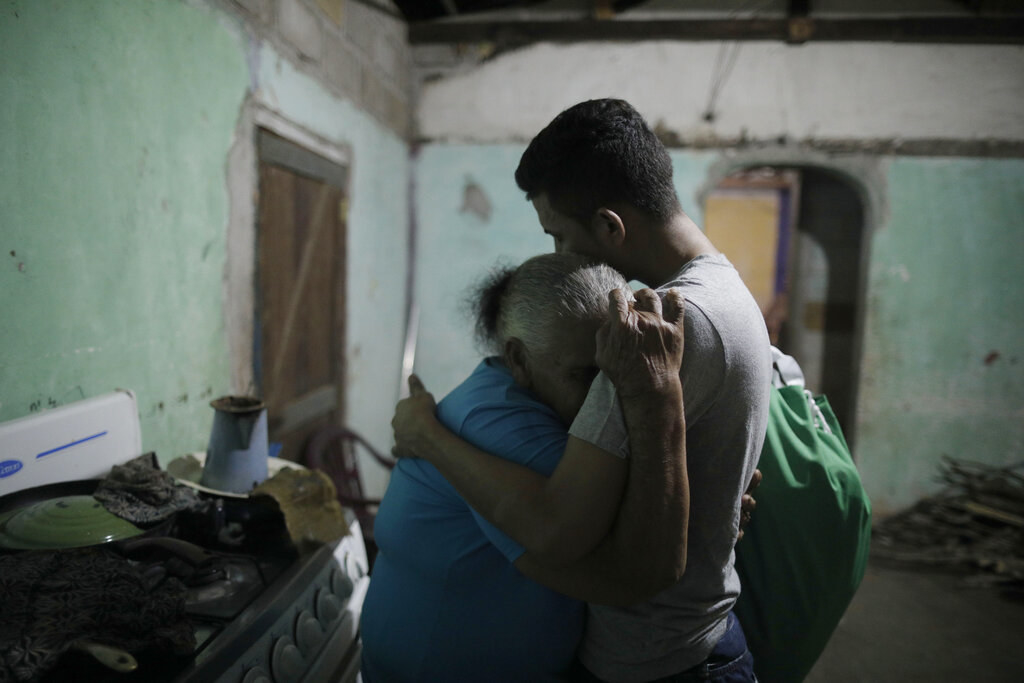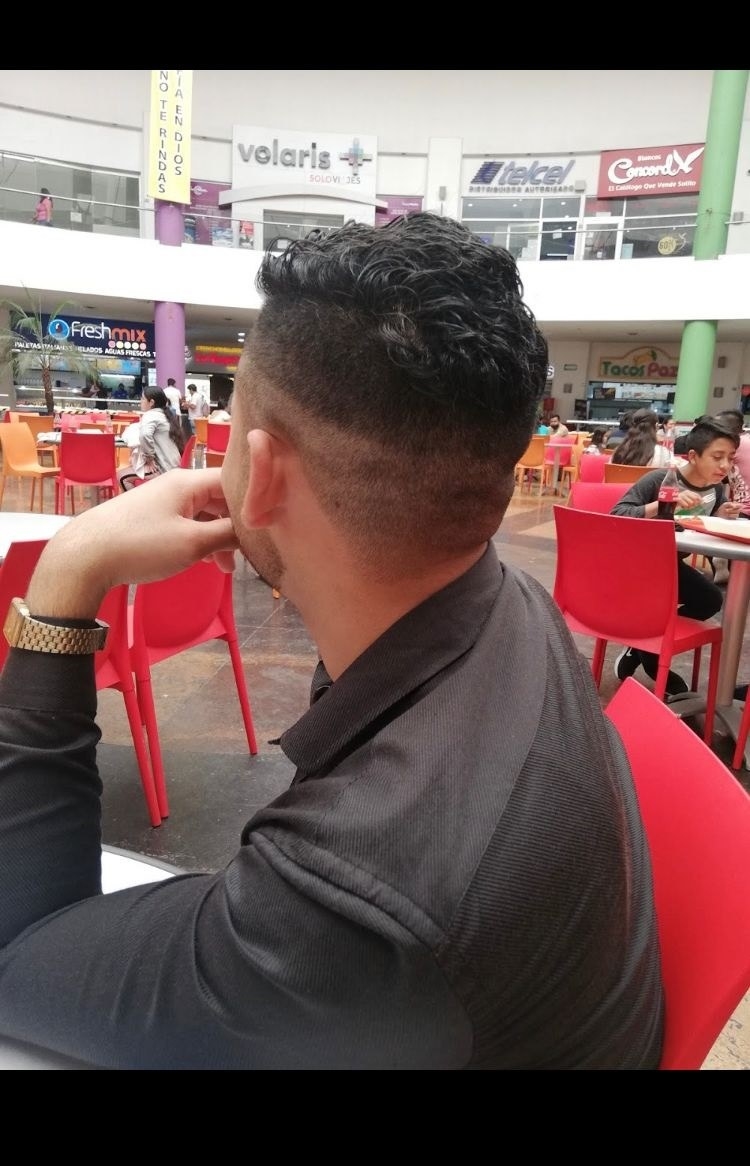
When Elena, a 30-year-old Honduran woman, arrived at the US border in December 2019, she was relieved. She had embarked on the long, perilous journey with her daughter after they had begun receiving threatening text messages from the men who’d killed her husband.
BuzzFeed News reviewed texts that say they’re from members of Mara, more commonly known as MS-13, a deadly gang with roots in the US that has forced thousands of Central Americans to flee their homes. The senders threatened to dump Elena and her daughter’s chopped-up bodies in bags.

“No matter how much you want to run away you will always fall and you will see that the Mara is in control,” one text message said.
Elena came to the US border for protection from that life, but she didn’t realize that she would be thrust into the Trump administration’s latest attempt to deter immigrants from El Salvador and Honduras from seeking asylum. To do so, former president Trump convinced Guatemala to take in asylum-seekers like Elena and her daughter. It’s there, US officials informed her, that she would need to find the protection she sought.
The relief she’d felt moments before suddenly turned to dread. Elena asked to use a pseudonym to protect her identity should she be sent back to Honduras.
"I wanted to cry; I didn't know what to do with my daughter," Elena told BuzzFeed News. "Guatemala is also an insecure country, and I didn't believe I could protect my daughter there."
In her effort to come to the US, Elena had become one of hundreds of immigrants forced into an unprecedented plan that was often overshadowed by other restrictions implemented by the Trump administration. The "safe third country" plan was rushed into effect in November 2019 and led to hundreds of immigrants being sent to Guatemala, a country also racked by poverty, violence, and instability and whose own citizens made up a sizable portion of those apprehended at the US–Mexico border.
A Senate Committee on Foreign Relations report in January also found that “not one of the 945 asylum seekers transferred from the United States to Guatemala has been granted asylum.”
But in recent weeks, the Biden administration has taken steps to help some of those affected by the deal with Guatemala, known as an Asylum Cooperative Agreement. In May, US officials agreed to allow six plaintiffs, including Elena, who sued over the safe third country plan to return to the US and seek asylum protections. But immigrant advocates believe more should be done for the hundreds of other immigrants sent to Guatemala. Biden administration officials have previously discussed allowing others sent to Guatemala under the policy a chance to apply for refugee status.
“The administration has thus far facilitated the return of just a few of the 945 people deported under the ACA program. It must now ensure that mechanisms are in place to permit the rest of this small number of wrongfully-deported asylum seekers to return to the United States and pursue their claims for asylum here,” a letter sent by immigrant advocacy groups to the Department of Homeland Security stated on Friday.
A DHS spokesperson the agency "has received and is reviewing the letter.”
Asylum-seekers who spoke to BuzzFeed News said being transferred to Guatemala was the same as being sent back to the countries they had fled due to its own struggling asylum system and violent instability.
Elena's husband was killed in 2013 by gang members who operate with near impunity in Honduras. Nothing came of the police investigation into his death. And then, a year later, the tortured body of Elena's sister-in-law was found. Again, police said they found nothing.
In the following years, Elena said she lived in peace in the capital city of San Pedro Sula, but in 2019, she started to receive text messages threatening to kill her daughter because she was related to her husband. To this day, she doesn’t know why.
"They told me I had to leave, that they had pardoned me for a long time but not anymore," Elena said. "I didn't see any other option other than to try to seek safety and protection for my daughter."
After being sent to Guatemala, Elena returned to Honduras, but knew she couldn't go to San Pedro Sula. She moved to the outskirts of the city and continued to move around for more than a year, staying in even smaller towns where she had family but always filled with fear and distress.
Despite changing her phone number, Elena continued to receive threats. At one point she asked police if they could offer some type of protection, but was told they didn't have the ability to investigate.

"I felt defeated,” Elena said. “The only thing I could do was cry because I felt so impotent not being able to find a safe place for my daughter."
In February, Elena considered trying her luck at crossing the US–Mexico border again because the threatening messages were becoming more frequent. Around the same time, her attorneys, who had filed the federal case against the Trump administration's safe third country program, called her to let her know that they might be able to bring her back to the US.
For about two months, the attorneys stayed in touch with Elena about negotiations with the Biden administration and in April told her to prepare for her return to the US.
"I was filled with happiness," Elena said. "I only asked God at that moment to make my departure date come quickly because I didn't want to keep moving from one place to another with my daughter. I felt like I was losing my strength."
On May 4, Elena landed in Miami to stay with a family friend and has been waiting to one day make her asylum case in front of a US immigration judge.
"I'm happy because being here I know my daughter is safe and I can breathe more easily," she said.
Back in 2019, the Trump administration hailed the safe third country program as an opportunity for asylum-seekers to pursue protection closer to their home countries, and, therefore, as then–acting Secretary of Homeland Security Chad Wolf said, “eliminating the need to make the dangerous journey north and lining the pockets of transnational criminal organizations.”
But in the final days before launching the controversial plan, Department of Homeland Security officials were still scrambling to figure out critical details, including how those seeking asylum would obtain shelter, food, and access to orientation services, according to government briefing materials obtained by BuzzFeed News. And internally at US Citizenship and Immigration Services, asylum officers were concerned about their own involvement and whether Guatemala had the infrastructure to adequately protect people.
Even the US government's own training materials for officers detailed the perils people face in Guatemala, including gangs, violence, and killings with “high levels of impunity.”
Keren Zwick, director of litigation at the National Immigrant Justice Center, which was one of the organizations that represented the six asylum-seekers returning to the US, said immigrants seeking protection were being sent to a country that couldn’t offer them protection.
“This is an atrocious policy,” Zwick told BuzzFeed News. “The significance of the Trump-era’s assault on asylum seekers, the Asylum Cooperative Agreement and all the others combined, will take generations to even begin to right. Those affected may never see the harm done to them undone.”
Zwick said that even though the six asylum-seekers were allowed into the US, attorneys will keep their cases active because the rule and guidance that allowed the safe third country program to be implemented haven’t been rescinded and advocates want to maintain the right to litigate any future use of them.
“As long as the ACA’s regulatory infrastructure exists, we’re in danger of something like this happening again,” Zwick said.

Pablo, another asylum-seeker who was sent to Guatemala and was also part of the lawsuit, decided to try his fate in Mexico instead of going back to his home in El Salvador. Pablo, who requested to use a pseudonym for fear of threats if he is ever sent back home, said he left El Salvador after he was told that if he didn’t sleep with one of the local gang’s leaders, things would end badly for him.
But after making it to the US border, Pablo was sent to Guatemala, where an official advised him to instead seek protection in Mexico.
Pablo then made his way to Jalisco, Mexico, where his boyfriend worked as a waiter. But things took a turn for the worse in December when he contracted COVID-19. And since he was undocumented, Pablo wasn’t able to tap Mexico’s public benefits, when his employer refused to pay him while he was away from work, that would've paid him a portion of his regular earnings.
Someone also attempted to rob him one night while he was at a bus stop. Thankfully, he said, he was only struck in the head with the butt of a knife, but it was just another reminder of how precarious his situation was.
Finally, in early 2021, Pablo's attorneys told him they were receiving positive responses from the Biden administration and he might be able to return to the US. On May 4, Pablo flew to Las Vegas to live with his aunt.
Leaving the airport, the 25-year-old immediately felt calm and relaxed for the first time in years. He also didn't feel judged for being gay.
"People like me come to this country to be happy and free from prejudice,” Pablo said. “I never felt that in Mexico or my country."
Leaving his partner behind in Mexico has been difficult because of the refuge he provided Pablo during some of his darkest moments. For now, neither can visit each other, but they hope to eventually reunite in the US.
Pablo also hopes to one day finish his architecture degree after winning his asylum case. When you're a kid you have big dreams, Pablo said, but they're impossible to attain in countries like El Salvador and Guatemala unless you have money to pay for school and, more importantly, can afford to live in an area where your life isn’t constantly at risk.
"Being here, you can achieve so many great things," he said.

